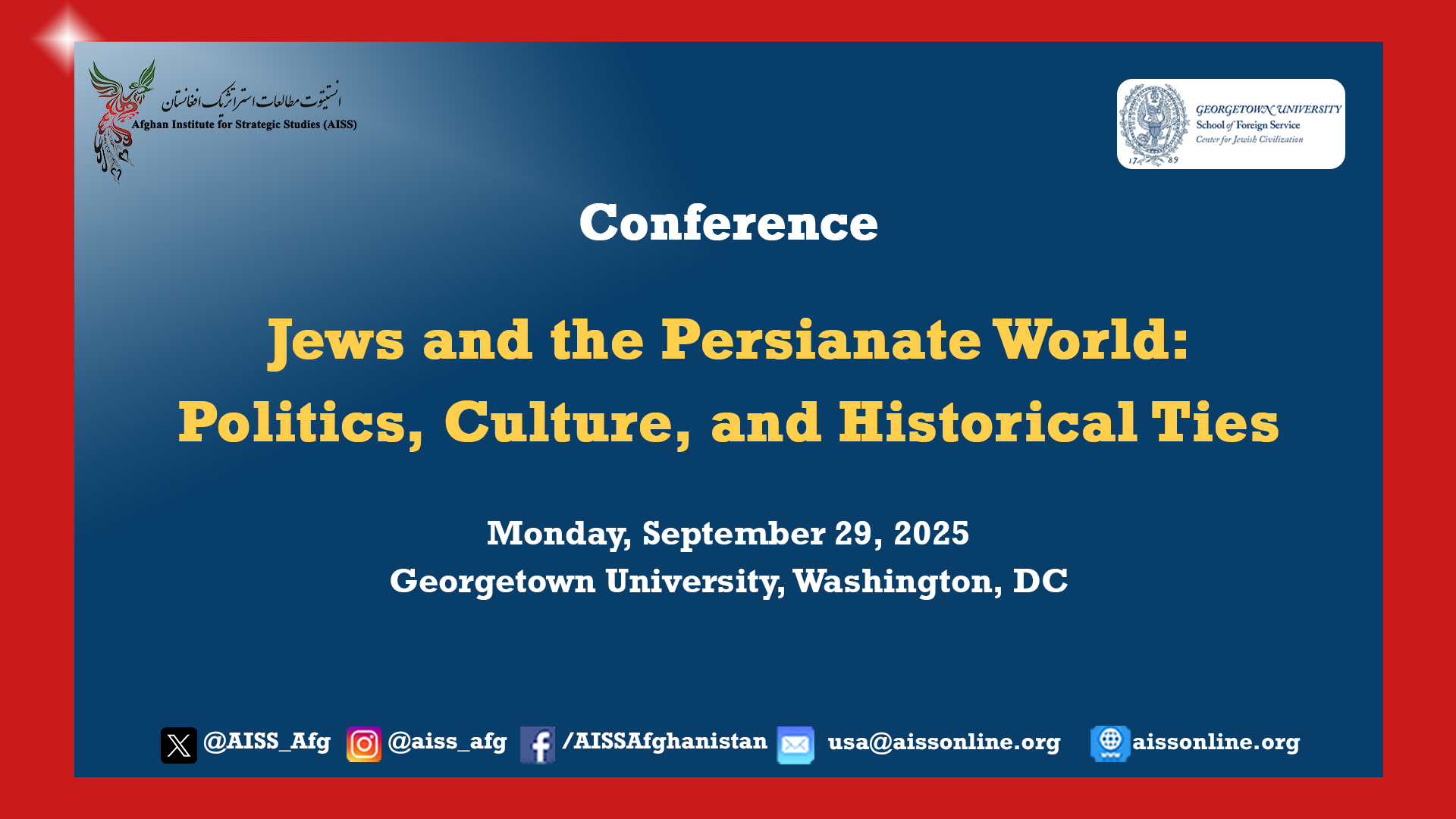DG of AISS’ Welcoming Speech
Good morning, ladies and gentlemen.
It is my great pleasure to welcome you all to today’s event on such an important topic, held here in the humble conference room of this prestigious university.
Our conference coincides with two significant celebrations and events: the Jewish holiday of Yom Kippur and the Persian festival of Mehregan. So, let me say—(gih-MAR chah-tee-MAH toe-VAH), and جشن مهرگان خجسته باد.
Now, I imagine some of you may have been surprised to receive an invitation to a conference on Jewish–Persian relations, organized by an institution with an Afghan identity. And indeed, I have often been asked: Why are we organizing such an event in today’s tragic and polarized climate surrounding the Holy Land?
Let me share with you four reasons why this issue is of great importance to us.
First, in 2018, the Afghan Institute for Strategic Studies, in partnership with the Universities of Sussex and Cambridge, launched a research project to explore the imagination and lived experiences of non-Muslims with their Muslim neighbors. We focused on Sikh and Jewish communities in Kabul, Herat, Bukhara, and New York.
Our research confirmed what we had always hoped: that Sikhs and Jews of Afghanistan carry a deep affection for their homeland, if not more so than their Muslim compatriots. Today, you will hear first-hand accounts from Jews of Herat, Mashhad, and Bukhara, who will share early memories of their beloved cities.
Second, on September 8, 2021, Mr. Zebulon Simentov—the last Jew of Afghanistan—left the country. His departure marked the end of more than two thousand years of Jewish presence in Afghanistan.
But his story is not only about one man. In the weeks and months that followed, more than eight million Afghans also fled the country—one of the largest displacements in modern history, the result of a so-called peace process negotiated by Mr. Khalilzad. Mr. Simentov’s forced departure reminds us that the fate of ordinary Muslims is closely tied to that of their non-Muslim neighbors, and that the cancer of militant Islamism has devastated all communities alike. Yet, like millions of Afghan and Iranian refugees around the world, Mr. Simentov still expresses a deep longing to return home.
Third, while preparing for this conference, hostility erupted between Israel and the Islamic Republic of Iran. At times, I found myself speaking simultaneously with people in both Israel and Iran, even as bombs and missiles were exchanged. It gave me the strange feeling of being a mediator amid an armed conflict.
And yet, surprisingly, I sensed no deep hatred between my Iranian and Israeli interlocutors—rather, a feeling of confusion and bewilderment. But the real shock came after the ceasefire, when the Iranian regime began the mass deportation of Afghan refugees. Nearly one million Afghans were expelled—one of the largest deportations in recent history. This was triggered, in part, by unfounded rumors of Afghan collaboration with Mossad.
Yesterday, Iran’s National Security Adviser blamed Israel for creating anti-Afghan hysteria in Iran; but he thanked the Taliban for their support to I.R. Iran.
This reminds us that the conflict between Israel and the Islamic Republic of Iran is not merely bilateral. It has profound regional consequences.
Fourth, since the Taliban’s takeover of Afghanistan, nearly one-third of our population has been forced to flee. That massive displacement sparked one of the largest global solidarity movements in recent memory. Jewish humanitarian organizations played a vital role in welcoming Afghan refugees—especially in the United States, where refugee protection programs were not well established.
In recognition of these efforts, in 2023, we awarded the Avicenna Peace Award for Intercultural Cooperation to honor this proud legacy of Jewish–Afghan collaboration and community engagement. Today’s program seeks to build upon that legacy.
Ladies and gentlemen,
There is a phrase once used by President Bush to describe Europe’s future: “A Europe, whole, united and free.”
I believe that in our part of the world—the Persianate world in its broadest sense—our spirit can only be restored if all of its communities—Jews, Muslims, Christians, and atheists alike—come together once again.
I hope today’s event will bring us one step closer to that shared vision.
Before I conclude, allow me to acknowledge those who made this gathering possible.
First, I thank our co-sponsoring partner, the Centre for Jewish Civilization, for trusting us to collaborate in such a critical and uncertain time. My deep gratitude also goes to Professor Ori Soltez, whose support and vision helped shape this event from the beginning.
The National Endowment for the Humanities has made possible many of our activities. The American Sephardic Foundation has mobilized its intellectual and community resources to enrich this program. And my friend, Ms. Zainab Khan—President of the Muslim American Leadership Alliance—has offered valuable support and advice. She even ensured we celebrate Rumi’s 818th birthday with a special cake.
Above all, I extend my deepest appreciation to our colleagues and volunteers, who have worked tirelessly over the past weeks: Tariq Baha, Haanya Malik, Amena Nezami, Habiba Ashna, and Sulaiman. They represent the passion, dedication, and competence of Afghan youth.
Finally, none of this would be meaningful without the trust of our speakers, moderators, and guests—some of whom have traveled from Israel and from cities around the world to be here today. For your presence and support, I am truly grateful.
Ladies and gentlemen, I wish you all a productive and inspiring conference.
Persian File Download

